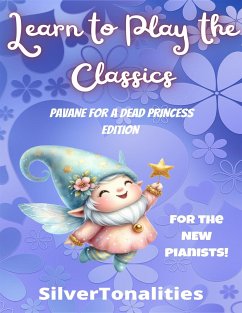Pavane for a Dead Princess, also known as Pavane pour une infante défunte,
is a piece for solo piano composed by the French Composer Maurice Ravel
in 1899.
Get to know this stately Dance that captures the solemnity and reverence of
a funeral procession, easily with the Letter Names embedded in each Note
Head for Quick and Easy Reading.
Learning to play the Piano can be a challenging and time-consuming process, especially for beginners.
With the innovative approach of embedding letter names in each Note Head, reading music becomes quick and easy.
This method allows players to easily identify the correct notes and by associating each note with its corresponding letter name, beginner Pianists can quickly grasp the fundamentals of sight-reading.
Whether you are just starting out, or looking to enhance your musical abilities, this simplified approach provides a fun and effective way to learn without feeling overwhelmed.
So why not give it a try? With SilverTonalities Arrangements, you’ll be amazed at how quickly you can progress and start playing your favorite pieces with confidence!
Preview, pages 1-4 Pavane for a Dead Princess, Fun Facts, page 5 The Key of G Major, pages 6-10 Ravel Breaking News!, page 11 The Key of B Minor, pages 12-17 Ravel’s Greatest Hits, page 18 The Key of D Minor, pages 19-24 Bolero, page 25 The Key of A Minor, pages 26-31 Daphnis and Chloe, page 32 Pavane for a Dead Princess Easy Piano Arrangement, pages 33-36 Gaspard de la Nuit, page 37 Pavane for a Dead Princess, Standard Notation Arrangement, pages 38-41 Barlines, page 42 Le Tombeau de Couperin, page 43 Lines and Spaces of the Treble Clef, page 44 Piano Concerto in G Major, page 45 Lines and Spaces of the Bass Clef, page 46 Rapsodie Espagnole, page 47 The Grand Staff, page 48 Hanon the “Virtuoso Pianist” Exercise Number 1, pages 49-50 Note Values, pages 51-53 Hanon Exercise Number 2, page 54-55 Rest Values, page 56-57 History of Classical Music, page 58 Hanon Exercise Number 3, page 59-60 Top Impressionistic/20th Century Compositions, page 61 Hanon Exercise Number 4, pages 62-63 The Impressionistic/20th Century Era, page 64 Hanon Exercise Number 5, pages 65-66 Top Ten Impressionistic/20th Century Composers, page 67 Note Stems, page 68 Piano Fingering, page 69 Note and Rest Values Breakdown, page 70 Rhythm Counting, page 71 Dynamics, page 72 The Circle of Fifths, page 73
is a piece for solo piano composed by the French Composer Maurice Ravel
in 1899.
Get to know this stately Dance that captures the solemnity and reverence of
a funeral procession, easily with the Letter Names embedded in each Note
Head for Quick and Easy Reading.
Learning to play the Piano can be a challenging and time-consuming process, especially for beginners.
With the innovative approach of embedding letter names in each Note Head, reading music becomes quick and easy.
This method allows players to easily identify the correct notes and by associating each note with its corresponding letter name, beginner Pianists can quickly grasp the fundamentals of sight-reading.
Whether you are just starting out, or looking to enhance your musical abilities, this simplified approach provides a fun and effective way to learn without feeling overwhelmed.
So why not give it a try? With SilverTonalities Arrangements, you’ll be amazed at how quickly you can progress and start playing your favorite pieces with confidence!
Preview, pages 1-4 Pavane for a Dead Princess, Fun Facts, page 5 The Key of G Major, pages 6-10 Ravel Breaking News!, page 11 The Key of B Minor, pages 12-17 Ravel’s Greatest Hits, page 18 The Key of D Minor, pages 19-24 Bolero, page 25 The Key of A Minor, pages 26-31 Daphnis and Chloe, page 32 Pavane for a Dead Princess Easy Piano Arrangement, pages 33-36 Gaspard de la Nuit, page 37 Pavane for a Dead Princess, Standard Notation Arrangement, pages 38-41 Barlines, page 42 Le Tombeau de Couperin, page 43 Lines and Spaces of the Treble Clef, page 44 Piano Concerto in G Major, page 45 Lines and Spaces of the Bass Clef, page 46 Rapsodie Espagnole, page 47 The Grand Staff, page 48 Hanon the “Virtuoso Pianist” Exercise Number 1, pages 49-50 Note Values, pages 51-53 Hanon Exercise Number 2, page 54-55 Rest Values, page 56-57 History of Classical Music, page 58 Hanon Exercise Number 3, page 59-60 Top Impressionistic/20th Century Compositions, page 61 Hanon Exercise Number 4, pages 62-63 The Impressionistic/20th Century Era, page 64 Hanon Exercise Number 5, pages 65-66 Top Ten Impressionistic/20th Century Composers, page 67 Note Stems, page 68 Piano Fingering, page 69 Note and Rest Values Breakdown, page 70 Rhythm Counting, page 71 Dynamics, page 72 The Circle of Fifths, page 73









